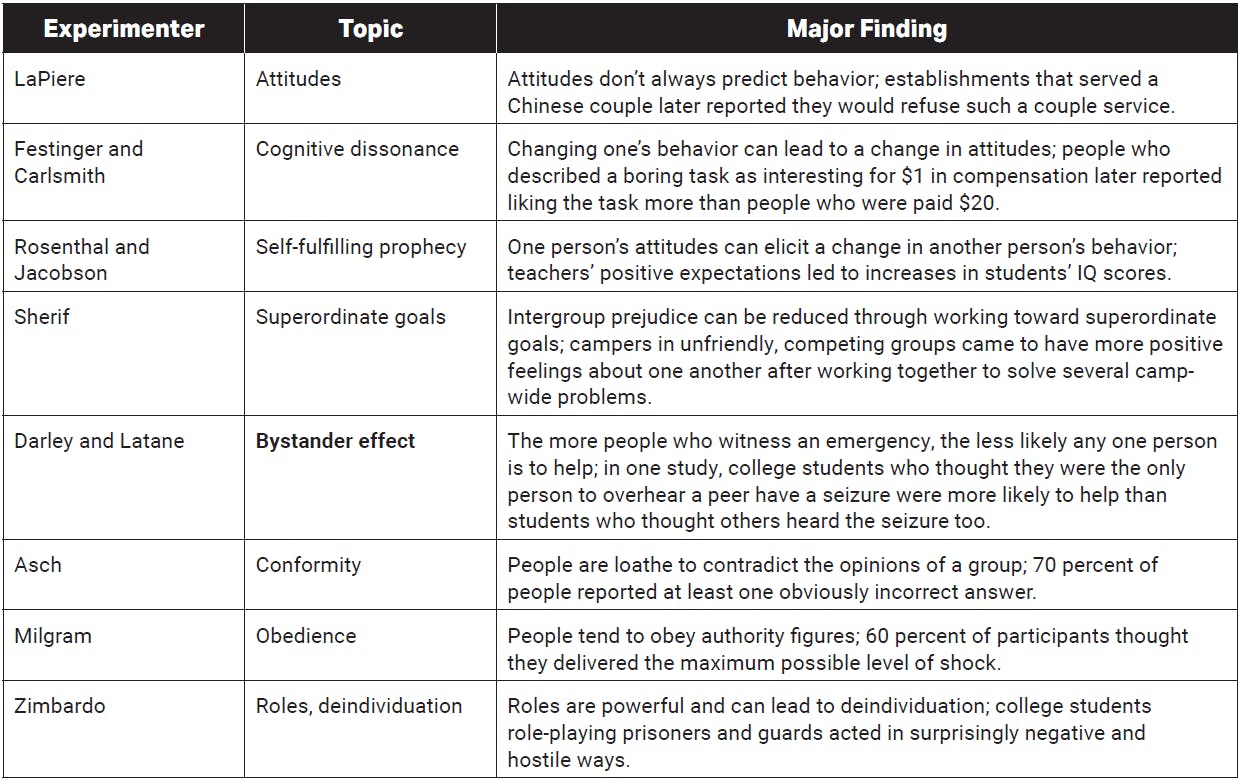AP Psychology Unit 4 Notes: Social Psychology, Personality, Motivation, and Emotion
January 27, 2025

These AP Psychology study notes are designed to help you review class material and get ready for the AP exam. You will find content from this unit in the social psychology, personality, motivation, and emotion chapters in the textbook you use for your AP Psychology class. More study strategies and expert tips can be found in our new AP Psychology prep book.
[ READ NEXT: AP Psychology Unit 5 Study Notes ]
AP Psychology: Unit 4 Summary
This unit looks at some of the main factors that shape human behavior. Social psychologists emphasize the role of the situation in affecting behavior, while the study of personality focuses more on thoughts and behaviors that are shaped over time and that become enduring aspects of people. The study of motivation explores what drives people to what they do, while the topic of emotion examines how people experience and express their feelings. Some of the most well-known and influential psychological research studies and theories are described and discussed in this unit.
AP Psychology: Unit 4 Key Terms
Below, we describe some of the key terms you should review ahead of the AP Psychology exam.
- Attribution theory: Attribution theory is another area of study within the field of social cognition. Attribution theory tries to explain how people determine the cause of what they observe. For instance, if your friend Charley told you he got a perfect score on his math test, you might find yourself thinking that Charley is very good at math.
- Attitude: An attitude is a set of beliefs and feelings. We have attitudes about many different aspects of our environment such as groups of people, particular events, and places. Attitudes are evaluative, meaning that our feelings toward such things are necessarily positive or negative.
- Cognitive dissonance theory: Cognitive dissonance theory is based on the idea that people are motivated to have consistent attitudes and behaviors. When they do not, they experience unpleasant mental tension or dissonance.
- Prejudice: Prejudice is an undeserved, usually negative, attitude toward a group of people. Stereotyping can lead to prejudice when negative stereotypes (those rude New Yorkers) are applied uncritically to all members of a group (she is from New York, therefore she must be rude) and a negative attitude results.
- Discrimination: While prejudice is an attitude, discrimination involves an action. When one discriminates, one acts on one’s prejudices. If I dislike New Yorkers, I am prejudiced, but if I refuse to hire New Yorkers to work in my company, I am engaging in discrimination.
- Social facilitation: A major area of research in social psychology is how an individual’s behavior can be affected by another’s actions or even merely by another person’s presence. Several studies have illustrated that people perform tasks better in front of an audience than they do when they are alone. They yell louder, run faster, and reel in a fishing rod more quickly. This phenomenon, that the presence of others improves task performance, is known as social facilitation.
- Conformity: Conformity has been an area of much research as well. Conformity is the tendency of people to go along with the views or actions of others.
- Groupthink: Groupthink, a term coined by Irving Janis, describes the tendency for some groups to make bad decisions. Groupthink occurs when group members suppress their reservations about the ideas supported by the group. As a result, a kind of false unanimity is encouraged, and flaws in the group’s decisions may be overlooked.
- Projective tests: Psychodynamic theorists may use projective tests to try to delve into the unconscious. These tests involve asking people to interpret ambiguous stimuli. For instance, the Rorschach inkblot test involves showing people a series of inkblots and asking them to describe what they see.
- Humanistic psychology: Free will is an idea that has been embraced by humanistic psychology. This perspective is often referred to as the third force because it arose in opposition to the determinism so central to both psychoanalytic and behaviorist models.
- Self-efficacy: Bandura also posited that personality is affected by people’s sense of self-efficacy. People with high self-efficacy are optimistic about their own ability to get things done, whereas people with low self-efficacy feel a sense of powerlessness. Bandura theorized that people’s sense of self-efficacy has a powerful effect on their actions.
- Personality inventories: A common way to gather data about personality is to use personality inventories. Personality inventories are essentially questionnaires that ask people to provide information about themselves.
- Instincts: Automatic behaviors performed in response to specific stimuli.
- Incentives: Sometimes behavior is not pushed by a need; it is pulled by a desire. Incentives are stimuli that we are drawn to due to learning.
- Extrinsic motivations: Rewards that we get for accomplishments from outside ourselves (for example, grades, salary, and so on).
- Intrinsic motivations: Rewards we get internally, such as enjoyment or satisfaction.
Famous Social Psychology Experiments
Review the famous social psychology experiments you should be familiar with ahead of the AP Psychology exam.

AP Biology Resources
- About the AP Biology Exam
- Top AP Biology Exam Strategies
- Top 5 Study Topics and Tips for the AP Biology Exam
- AP Biology Short Free-Response Questions
- AP Biology Long Free-Response Questions
AP Psychology Resources
- What’s Tested on the AP Psychology Exam?
- Top 5 Study Tips for the AP Psychology Exam
- AP Psychology Key Terms
- Top AP Psychology Exam Multiple-Choice Question Tips
- Top AP Psychology Exam Free Response Questions Tips
- AP Psychology Sample Free Response Question
AP English Language and Composition Resources
- What’s Tested on the AP English Language and Composition Exam?
- Top 5 Tips for the AP English Language and Composition Exam
- Top Reading Techniques for the AP English Language and Composition Exam
- How to Answer the AP English Language and Composition Essay Questions
- AP English Language and Composition Exam Sample Essay Questions
- AP English Language and Composition Exam Multiple-Choice Questions
